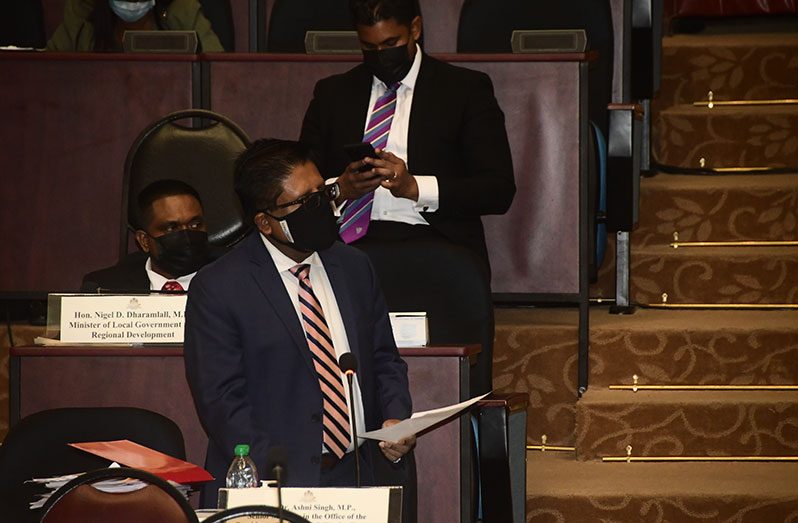–stipulates that oil revenues could only be used for developmental projects
REVENUES earned from Guyana’s petroleum industry could only be used to finance national developmental projects, and/or respond to major natural disasters.
This firm stipulation was outlined in the Natural Resources Fund (NRF) 2021 Bill, which was tabled in the National Assembly on Thursday by Senior Minister in the Office of the President with responsibility for Finance, Dr. Ashni Singh.
The newly proposed law seeks to repeal the ‘inadequate’ NRF Act of 2019, which was reportedly hurriedly implemented by the former coalition government, even after it was toppled with the passage of a no-confidence motion in December 2018.
Financial experts at home and abroad had complained that the existing Act, among other things, gave too much power to the Minister of Finance, who is afforded the final say on how oil revenues are spent and how much could be withdrawn.
However, with the newly proposed law, withdrawals, except those made for emergencies, have specific ceilings, and can only be made once there is parliamentary approval.
Once this new Bill is signed into law by President Dr. Irfaan Ali, it will enable the government to make a 100 per cent withdrawal from the country’s Sovereign Wealth Fund, which holds oil revenues totalling US$534 million.
All other withdrawals will, however, be capped. The cap will take effect at 75 per cent of the second US$500 million deposited into the NRF during the preceding fiscal year, followed by 50 per cent, then 25 per cent, five per cent, and finally, three per cent of any amounts in excess of $2.5 billion.
Those caps are being instituted as a means of ensuring that all Guyanese are better equipped to calculate how their country’s oil earnings are being spent.
It follows an observation made by one of Guyana’s leading financial partners, the Inter-American Development Bank (IDB); this institution had said that the design of the 2019 NRF Act “departs from good practices” and that its complexity may “conspire against fiscal transparency and public understanding.”
When the People’s Progressive Party/Civic (PPP/C) government assumed office in 2020, it pledged to right the wrongs of the Act before any withdrawals are made.
Also, in keeping with proper financial regulations, all withdrawals of oil revenues must first be deposited into the Consolidated Fund, from which the government could then begin to spend. And, requests for withdrawals would also have to be made as part of the country’s annual budget.
BOARD OF DIRECTORS
Further, in seeking to limit the powers of the finance minister, the Bill proposes that the fund be governed by a Board of Directors, comprising no less than three and no more than five members, including the chairperson, who shall be appointed by the President.
These would essentially have to be persons with “wide experience and ability” in legal, financial, business or administrative matters, one of whom shall be nominated by the National Assembly and one of whom shall be a representative of the local private sector.
The Bill, as presented by Minister Singh, requires that all appointments and changes in to the NRF Board of Directors be published in the Official Gazette, on the website of the Ministry of Finance and in at least two of the local daily newspapers.
The board itself is proposed to have a lifespan of two years, after which it shall be “eligible for reappointment.”
The board, as proposed, would be responsible for overall management of the fund; reviewing and approving policies of the fund; monitoring performance of the fund; ensuring compliance with the approved policies of the fund; exercising general oversight of all aspects of the operations of the fund; and ensuring that the fund is managed in compliance with the act and all other applicable laws.
Additionally, the board members will be required to adhere to a strict Code of Conduct while executing their duties.
The NRF 2021 legislation also proposes the establishment of a Public Accountability and Oversight Committee as well as an Investment Committee.
The Oversight Committee is projected to comprise a person nominated by the National Assembly, along with three representatives of the religious community, among others.
This committee too will also have a lifespan of two years, during which time it will be responsible for providing non-governmental oversight of the Natural Resources Fund.
It will receive quarterly reports from the Board of Directors on operations of the fund, and meet no less than quarterly with the board to be briefed on operations of the fund. The committee will also be mandated to furnish the Speaker of the National Assembly with annual reports on the fund’s performance.
Appointments and changes in appointments to the committee will also have to be gazetted.
Added to that, the NRF management team will also comprise an Investment Committee, which will have seven members, inclusive of a chairperson nominated by the Finance Minister.
The Leader of the Parliamentary Opposition, as well as the private sector and the Attorney General will also have the opportunity to select their respective representatives.
The committee is also projected to boast two ex-officio non-voting members; the senior investment adviser and analyst, and a nominee of the Governor of the Bank of Guyana.
Those persons will all be required to have at least 10 years experience and expertise in financial investments and financial portfolio management. Meanwhile, the Central Bank will be responsible for the operational management of the fund, and ensuring that it fulfils its investment mandate.


.jpg)











